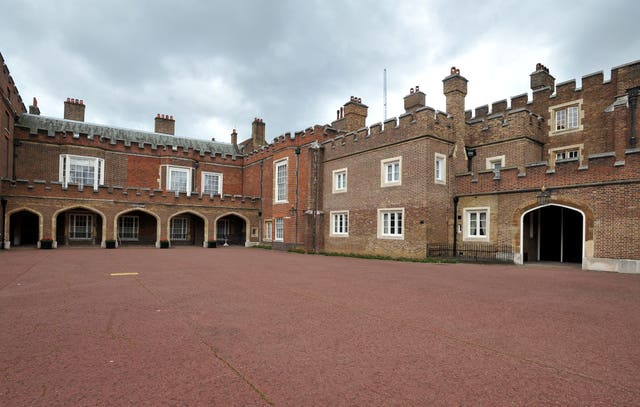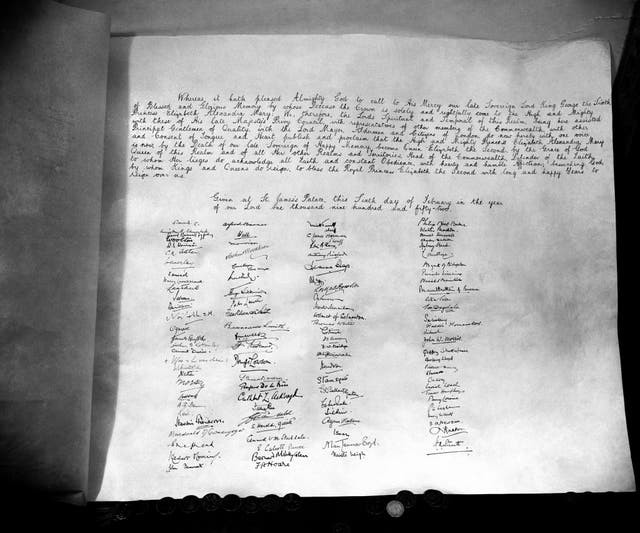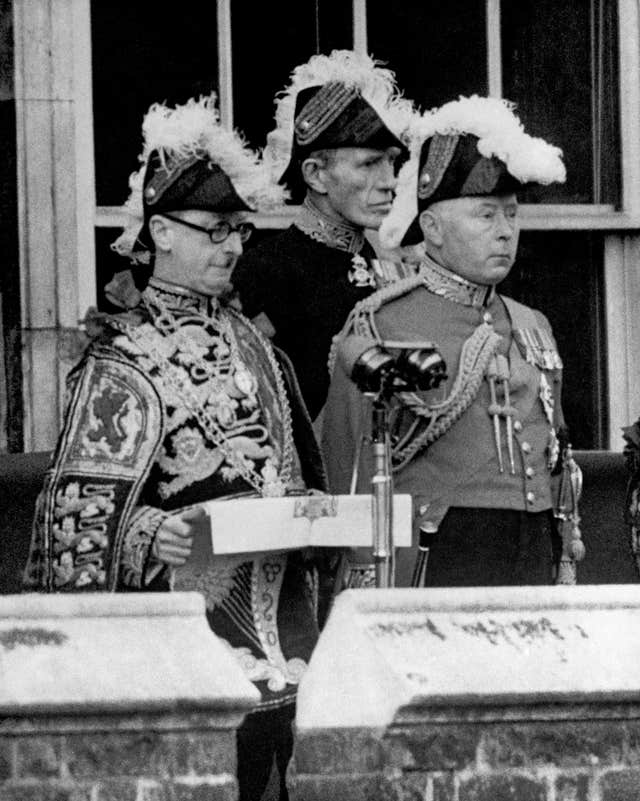
The new King will be formally proclaimed monarch at a historic Accession Council on Saturday.
Charles has automatically become King on the death of his mother, but an Accession Council is usually convened at St James’s Palace in London within 24 hours of the death of a sovereign.
It will be later following the death of the Queen because the announcement of her death did not come until early evening on Thursday, meaning there was not enough time to set the plans in motion for Friday morning.
Historically, the entire Privy Council is summoned to the Accession Council to oversee the formal proclamation of a new monarch.
 Charles, the new King (Adam Davy/PA)
Charles, the new King (Adam Davy/PA)
But with the number of privy counsellors – who are lifetime members and mostly past and present politicians – now standing at more than 700, restrictions have been put in place.
Just 200 will be summoned, and those cut will be asked to enter an annual ballot for a few remaining seats, with the decision prompting a row over the lack of consultation and the loss of the key duty, the Telegraph previously reported.
The Accession Council must take place before parliament meets, and parliament should meet as soon as practicable after the death of a sovereign.
The Accession Council is divided into two parts, and is presided over by the Lord President of the Council, who has ministerial responsibility for the Privy Council Office.
Penny Mordaunt was appointed Lord President of the Council, and Leader of the House of Commons, on September 6 in Liz Truss’s new cabinet, in place of Mark Spencer, with the Queen officially approving the appointment.
Ms Mordaunt is yet to be “declared” Lord President at a Privy Council meeting because the event was postponed on Wednesday when the Queen was urged to rest.
– Part l – The Proclamation
The chosen Privy counsellors – without the King – will gather at St James’s Palace to proclaim the new sovereign, joined by Great Officers of State, the Lord Mayor and City Civic party, Realm High Commissioners and some senior civil servants.
If any of the counsellors summoned are not able to attend at short notice, the Council can still take place.
 Friary Court at St James’s Palace, in central London, where the public proclamation will take place (Nick Ansell/PA)
Friary Court at St James’s Palace, in central London, where the public proclamation will take place (Nick Ansell/PA)
Camilla – the new Queen – and the Duke of Cornwall and Cambridge are already privy counsellors so will be present.
When the meeting begins, the Lord President announces the death of the sovereign and calls upon the Clerk of the Council to read aloud the text of the Accession Proclamation.
It will include Charles’s chosen title as King – already known to be King Charles III.
The platform party – made up of Camilla and William, the Archbishop of Canterbury, the Lord Chancellor, the Archbishop of York, the Prime Minister, the Lord Privy Seal, the Lord Great Chamberlain, the Earl Marshal and the Lord President – sign the Proclamation.
The Lord President then calls for silence and reads the remaining items of business, which deal with the dissemination of the Proclamation and various orders giving directions for firing guns at Hyde Park and the Tower of London.
– Part II – The King’s First Privy Council
Charles then enters and holds his first Council, which is only attended by Privy Counsellors.
He will first make a personal declaration about the death of the Queen.
Then one of his next acts will be to take the oath to preserve the Church of Scotland – because in Scotland there is a division of powers between Church and State.
He will read it out loud and sign two identical Instruments recording the taking of the oath, with his signature witnessed by Camilla and William, and others including the Secretary of State for Scotland and the Scottish First Minister.
Another oath, the Accession Declaration, to maintain the protestant succession, is normally made several months later at the State Opening of Parliament.
Other business will be dealt with, including the use of the Seals, to “facilitate the continuity of government”.
Privy counsellors will sign the Proclamation as they leave.
 The signed Proclamation of Accession of Queen Elizabeth II in 1952 (PA)
The signed Proclamation of Accession of Queen Elizabeth II in 1952 (PA)
The official record of proceedings will be published in a special supplement to the London Gazette.
– The first public proclamation
After the Accession Council, the first public proclamation of the new sovereign is read in the open air from the Friary Court balcony by the Garter King of Arms at St James’s Palace in the presence of the Earl Marshal and two of the sovereign’s Serjeants at Arms.
Amid great ceremony, trumpeters usually play a fanfare from the balcony and gun salutes are fired in Hyde Park and at the Tower of London at the same time.
The Proclamation will then be read at the Royal Exchange in the City of London.
 The garter King of Arms, Sir George Bellew, reads the first public proclamation of the accession of Queen Elizabeth II in 1952 (PA)
The garter King of Arms, Sir George Bellew, reads the first public proclamation of the accession of Queen Elizabeth II in 1952 (PA)
It will also be read out publicly in other cities including Edinburgh, Cardiff and Belfast and usually at Windsor and in York, where the mayor traditionally drinks to the new sovereign’s health from a golden goblet.
The Privy Council – the oldest form of legislative assembly still functioning in the UK – dates from the time of the Norman kings when the monarch met in private – hence the description Privy – with a group of trusted counsellors who fulfilled the role the cabinet performs today.
The sovereign is its head and the body advises the monarch as they carry out duties as head of state.
The council also provides administrative support for the leaders of the Commons and Lords and has responsibility for the affairs of 400 institutions, charities and companies incorporated by royal charter.
It has a judicial role as the court of final appeal for UK overseas territories and crown dependencies and for a number of Commonwealth countries.
Meetings take place with members standing up throughout.
Queen Victoria is believed to have started the convention in 1861 following the death of her beloved consort Prince Albert when she wished to reduce her public duties to the minimum necessary.


Why are you making commenting on The Herald only available to subscribers?
It should have been a safe space for informed debate, somewhere for readers to discuss issues around the biggest stories of the day, but all too often the below the line comments on most websites have become bogged down by off-topic discussions and abuse.
heraldscotland.com is tackling this problem by allowing only subscribers to comment.
We are doing this to improve the experience for our loyal readers and we believe it will reduce the ability of trolls and troublemakers, who occasionally find their way onto our site, to abuse our journalists and readers. We also hope it will help the comments section fulfil its promise as a part of Scotland's conversation with itself.
We are lucky at The Herald. We are read by an informed, educated readership who can add their knowledge and insights to our stories.
That is invaluable.
We are making the subscriber-only change to support our valued readers, who tell us they don't want the site cluttered up with irrelevant comments, untruths and abuse.
In the past, the journalist’s job was to collect and distribute information to the audience. Technology means that readers can shape a discussion. We look forward to hearing from you on heraldscotland.com
Comments & Moderation
Readers’ comments: You are personally liable for the content of any comments you upload to this website, so please act responsibly. We do not pre-moderate or monitor readers’ comments appearing on our websites, but we do post-moderate in response to complaints we receive or otherwise when a potential problem comes to our attention. You can make a complaint by using the ‘report this post’ link . We may then apply our discretion under the user terms to amend or delete comments.
Post moderation is undertaken full-time 9am-6pm on weekdays, and on a part-time basis outwith those hours.
Read the rules hereLast Updated:
Report this comment Cancel